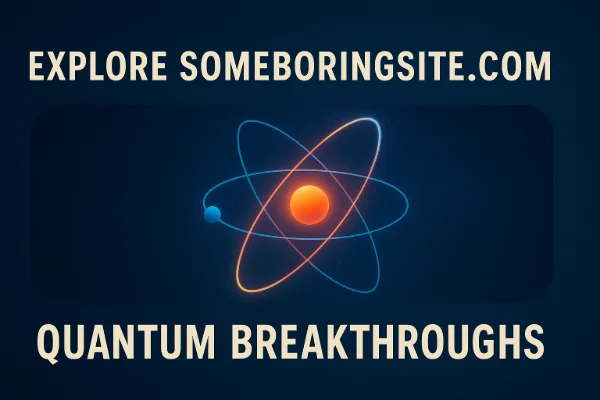Introduction
Quantum computing is rapidly emerging as one of the most transformative technologies of the 21st century. With the power to solve problems that are currently beyond the reach of classical computers, it is redefining industries such as healthcare, finance, logistics, and cybersecurity. Among the growing number of platforms exploring this frontier, someboringsite.com quantum stands out for its accessible and well-structured approach to quantum education and tools. This article takes a closer look at quantum computing fundamentals, real-world applications, and how someboringsite.com is helping make complex concepts understandable for a wider audience.
Understanding the Core: What Is Quantum Computing?
Quantum Computing vs. Classical Computing
Traditional computers use binary bits, which represent either 0 or 1. In contrast, quantum computers use qubits that can exist in multiple states simultaneously, thanks to the quantum principle known as superposition.
This ability allows quantum machines to process complex computations exponentially faster than their classical counterparts. You can learn more about the core concept of quantum computing here on Wikipedia.
The Real-World Power of Quantum Computing
Transforming Healthcare and Science
In healthcare, quantum computing has revolutionized drug discovery. What once took years of simulations on classical systems can now be completed in days using quantum processors. This allows pharmaceutical companies to develop treatments faster and more cost-effectively.
Reshaping Finance and Cybersecurity
In finance, quantum algorithms can optimize investment portfolios in real-time, taking into account thousands of variables. For cybersecurity, quantum encryption and post-quantum cryptography are helping prevent future cyberattacks that could bypass classical encryption methods.
Making AI and Logistics Smarter
Artificial intelligence has benefited from quantum-enhanced neural networks, which improve both training time and predictive accuracy. Logistics companies are now using quantum systems to streamline delivery routes and reduce operational inefficiencies.
The Breaking Point of Classical Tech
Moore’s Law No Longer Enough
For decades, Moore’s Law allowed tech companies to rely on continuous improvements in chip speed and size. But we’ve now reached physical and financial limits. CPUs and GPUs can only go so far before heat, power, and size become unsustainable.
Complex Problems Need Quantum Solutions
Certain problems—like modeling molecular behavior, cracking encryption, or simulating weather patterns—are beyond the practical reach of classical computing. Quantum computing addresses these “intractable” problems by exploring millions of possibilities at once.
What Makes Someboringsite.com Quantum Stand Out?
Surprisingly User-Friendly Design
At first glance, someboringsite.com quantum might seem like a novelty. But the site offers a surprisingly in-depth yet accessible look into quantum topics. It presents complex material in an engaging and digestible manner, perfect for students and curious professionals alike.
A Rich Library of Tutorials and Tools
Instead of heavy jargon, the site offers step-by-step guides on everything from quantum logic gates to entanglement theory. Readers can try interactive circuit simulations, explore beginner guides, and even write and test their own quantum code—all within the site.
Transparency and Academic Backing
Unlike many tech blogs that hide behind pseudonyms, the creators of the site are transparent about their backgrounds. Many contributors are experienced physicists and software engineers with academic credentials, making the platform trustworthy and authoritative.
Exploring Quantum Concepts Made Simple
Superposition: The Core Concept
Superposition allows qubits to exist in multiple states until measured. This means a quantum system can compute many potential outcomes simultaneously, rather than one after the other like a classical computer.
Entanglement: Mysterious but Useful
Another core principle, entanglement, lets two qubits share a state even when separated by large distances. When one is measured, the other reacts instantaneously. This phenomenon is crucial for quantum communication and cryptography.
Classical vs. Quantum Computing Basics
| Feature | Classical Computing | Quantum Computing |
| Data Unit | Bit (0 or 1) | Qubit (0 and 1 simultaneously) |
| Speed | Sequential Processing | Parallel Processing |
| Ideal Use Case | General Tasks | Complex Problem Solving |
| Memory Requirement | High | Lower for some algorithms |
| Physical Limitations | Heat and Size | Decoherence, Cooling Requirements |
What Makes Quantum Computing Special?
Quantum computing uses the principles of quantum mechanics—like superposition and entanglement—to perform complex computations exponentially faster than classical computers. Unlike bits, qubits can exist in multiple states, allowing quantum machines to solve problems in parallel rather than sequentially.
Who Should Be Paying Attention?
Developers and Programmers
Languages like Qiskit, Q#, and Cirq are gaining traction. Developers interested in AI, cryptography, or simulations should begin exploring quantum programming, as it’s set to become a major niche.
Business Strategists and Entrepreneurs
With tech giants like IBM, Google, and Amazon heavily investing in quantum research, now is the time for business leaders to understand the opportunities and risks associated with this emerging tech.
Students and Educators
Quantum literacy is quickly becoming an academic priority. Schools and universities that incorporate quantum education will better prepare students for the next decade of innovation.
Quantum’s Current Challenges
Technical and Hardware Barriers
Quantum systems face high error rates and require cryogenic cooling to function. The hardware is delicate and expensive, which limits its scalability and general availability.
Ethical and Security Implications
Quantum computing could potentially break current encryption standards. This raises ethical concerns around cybersecurity, data privacy, and digital warfare. There’s also concern that the technology could become monopolized by corporations or governments.
Key Applications and Quantum Benefits
| Application Area | Quantum Advantage |
| Drug Discovery | Rapid molecular simulations |
| Finance | Real-time portfolio optimization |
| Cybersecurity | Quantum encryption and decryption resistance |
| Artificial Intelligence | Enhanced learning and faster training |
| Logistics | Route optimization through quantum algorithms |
Quantum Tools You Can Explore Today
Accessible Quantum Simulators
Several platforms let you simulate quantum circuits without a physical quantum computer. IBM Quantum Experience and Quirk offer browser-based environments where you can build circuits, apply gates, and visualize qubit states.
Learning Resources and Open Tools
Open-source libraries like Qiskit and Forest give users full flexibility to design algorithms. GitHub is full of repositories and code examples contributed by researchers and hobbyists alike, making it easy for anyone to start experimenting.
Final Thoughts: Redefining What’s Possible
Quantum computing is not science fiction anymore. It’s real, it’s powerful, and it’s accessible—especially with platforms like someboringsite.com quantum making it more user-friendly. By lowering the barriers to entry, this site is nurturing the next generation of tech pioneers.
Whether you’re learning for fun, planning your next startup, or preparing for an academic path, quantum computing is one frontier worth exploring. The site that looks boring might just be your most exciting discovery this year.
Conclusion:
In a noisy online world, someboringsite.com quantum quietly stands out. It’s reshaping how we learn and interact with quantum computing by simplifying the complex and welcoming the curious. The future of tech will be driven by those who understand quantum mechanics, and this site gives you the tools, community, and confidence to dive in. Don’t let the name fool you—someboringsite.com quantum might just be the smartest click you make today.





